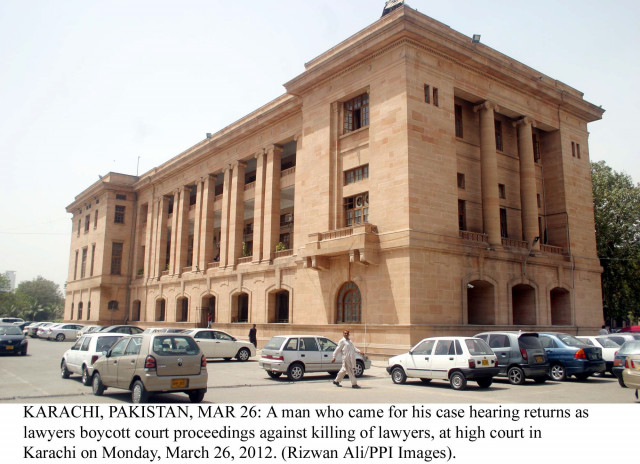Restricting movement: ‘With a higher position in the office, comes more responsibility’
SHC questions blockades in Badar Commercial due to residence of incumbent President.

The judges felt that the only restriction that can be imposed should be “reasonable restriction imposed by the law.” PHOTO: FILE
The Sindh High Court, while hearing a case on Wednesday on blockades of public roads in the city, observed that the individuals holding high positions in the public and constitutional offices had more responsibility to abide by the Constitution.
SHC Chief Justice Mushir Alam passed these comments after he was informed by the police that a road in Badar Commercial, Defence Housing Authority has been blocked since the incumbent President moved to this area.
The bench was hearing a miscellaneous application filed by Advocate Amir Aziz, seeking removal of blockades from some of the busiest roads in the city.
In 1992, Aziz had challenged the closure of two roads - the Court Road and Kamal Ata Turk Road - for the general public by the government.
On August 16 the court had ordered police’s senior superintendent for the district South to give details about the roads and streets barricaded under the security concerns.
Filing his report, the SSP said that most of the consulates were in district South, adding that most of them were located in the residential areas due to lack of a separate diplomatic enclave for the foreign missions.
According to him, most of the consulates were under threat from various terrorist organisations and bomb blasts and terrorist activities had been carried out in these areas in the past.
Producing a list, the SSP added that the street adjacent to the British Consulate approaching Shahra-e-Iran has been blocked with the consultation of the area’s residents and its blockade was not affecting the general public. The street approaching the Chinese Consulate was blocked after the bomb blast and was also done after consultation and on demand of the residents of the locality.
“The front of 7-A Badar Commercial has been blocked as the residence of the incumbent President is located in this area. The area’s residents and general public have been provided alternate routes and ways,” the police officer explained.
He maintained that all these measures have been taken to avoid any terrorist activity so that the life and property of the president, foreign diplomats and general public could be saved.
“The court is mindful of the security hazards and responsibilities of the state,” observed CJ Mushir Alam, adding that the court was also mindful of the right of the citizens guaranteed under the Constitution, including the right of freedom of movement in terms of Article 16 of the Constitution.
The judges felt that the only restriction that can be imposed should be “reasonable restriction imposed by the law.”
“It may be observed that the higher the position of the public and constitutional office holder, more the responsibility to abide by the Constitution and law,” the bench remarked in an indirect reference to blocking of the road due to shifting of the new president to Badar Commercial, DHA.
The bench said it was expected that the local administration and Sindh government would take measures to protect dignitaries while at the same time, preserve and protect the right of freedom of movement of the citizens.
The bench asked the advocate general to personally look into the matter and render assistance to the local administration as well as the court in addressing this important issue. The bench also issued notice to the president and secretaries of the Sindh High Court Bar Association and the vice-chairperson of the Sindh Bar Council to assist the court in this regard. The matter will be taken up after two weeks.
Published in The Express Tribune, September 5th, 2013.


















COMMENTS
Comments are moderated and generally will be posted if they are on-topic and not abusive.
For more information, please see our Comments FAQ